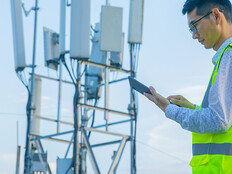Smart Cities Connect 2019: Philadelphia Eyes Initial Smart City Pilots
Philadelphia is having a moment, agreed panelists discussing the city’s smart city plans at the Smart Cities Connect 2019 conference at National Harbor, Md., on Wednesday.
In recent years, the city hosted the Democratic National Convention and won the Super Bowl, and soon, panelists noted, it will host a national celebration for the 250th anniversary of the Declaration of Independence. But Philadelphia is also facing a crucial year in its transformation into a smart city, said CIO Mark Wheeler.
The SmartCityPHL plan, launched in February 2018, calls for Philadelphia to “do more with less” and “create capacity” to re-engineer processes, Wheeler said. “It is to make sure we are taking assets, we are not wasting them, and we are coordinating with a very clear set of processes,” he said.
When it comes to action, Philadelphia is planning ahead by setting aside money for smart city projects, Wheeler added. The city can spend up to $34,000 without a request for proposals, so the Office of Innovation and Technology can dedicate money to small pilots quickly. For fiscal 2020, Philadelphia has set aside $150,000 in budget for smart city projects.
Technology Office Centralizes View of Disparate Smart Projects
“We’re not waiting to do pilots. We’re doing them,” Wheeler said.
The Philadelphia Water Department is using the Internet of Things and sensors to monitor infrastructure, he said. The Philadelphia Public Health Department monitors air with sensors to measure gases and hazards.
The city takes data from a Comcast LoRaWan system that measures inputs in various areas around the city, Wheeler said. The system, called MachineQ, is a low-power IoT network that can provide utility metering, environmental monitoring, asset tracking and more.
In addition to the money set aside for smart city projects, Philadelphia augments its smart city initiatives with investments in hardware and networking as well as a separate project to integrate information from various data sources for analysis.
Philadelphia plans to hire a smart city procurement specialist to augment its two-person smart city team, which includes Wheeler, in part to master a difficult city procurement process.
Ideally, Wheeler would like to see Philadelphia adopt a model where a pilot program becomes part of a competitive bidding process, and selection of the pilot solutions provider becomes a yearlong interview to determine whether that provider is the right candidate to handle the program.
MORE FROM STATETECH: Philadelphia's open data program improves the lives of citizens.
City Transportation Department Values Citizen Input
Michael Carroll, Philadelphia’s deputy managing director of transportation and infrastructure systems, said his department goes into neighborhoods to collect feedback from residents on projects ranging from bike lanes to streetlights. Following a “mini city hall” model, officials listen to constituents and incorporate their thoughts into the next stages of their plans.
“We benefit by taking that information back to the lab and channeling that information to the right people to start developing solutions across silos,” Carroll said.
Philadelphia owns a lot of its infrastructure and controls large amounts of it. The city seeks to maintain ownership of that infrastructure over time as much as possible, which fortifies its smart city prospects, Carroll said. For example, Philadelphia has exercised caution in establishing small cell antenna projects to consider all input.
Ownership “is built into the DNA of the city. We want to leverage that to bring people in so they can be successful working with us. But we don’t lose that certain level of control that allows us to be responsive to constituencies that are at the margins,” Carroll said.
Read more articles from StateTech’s coverage of the Smart Cities Connect 2019 conference here.









